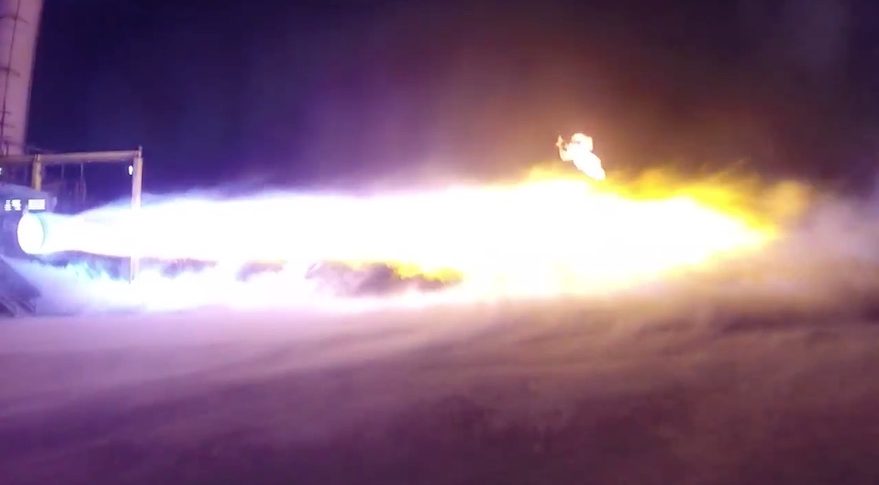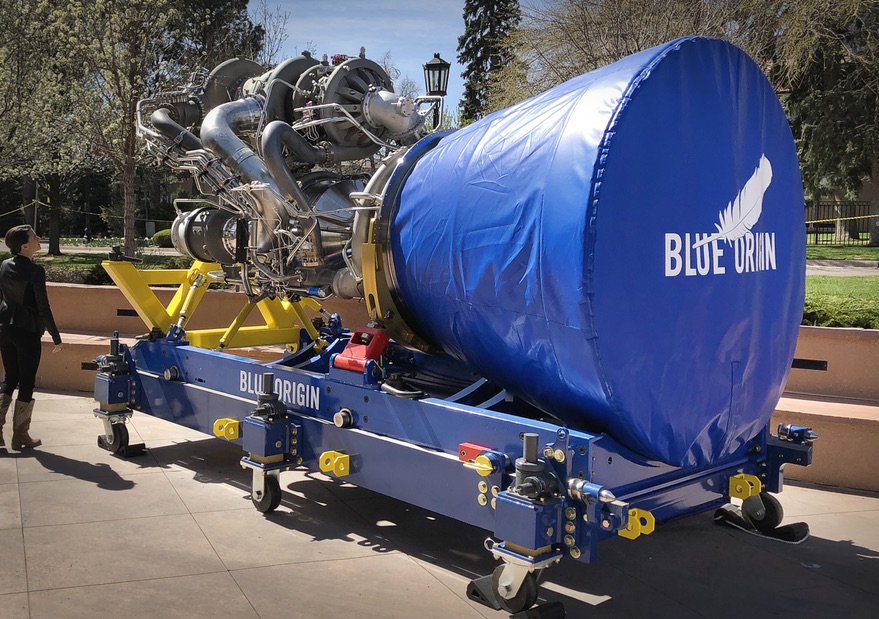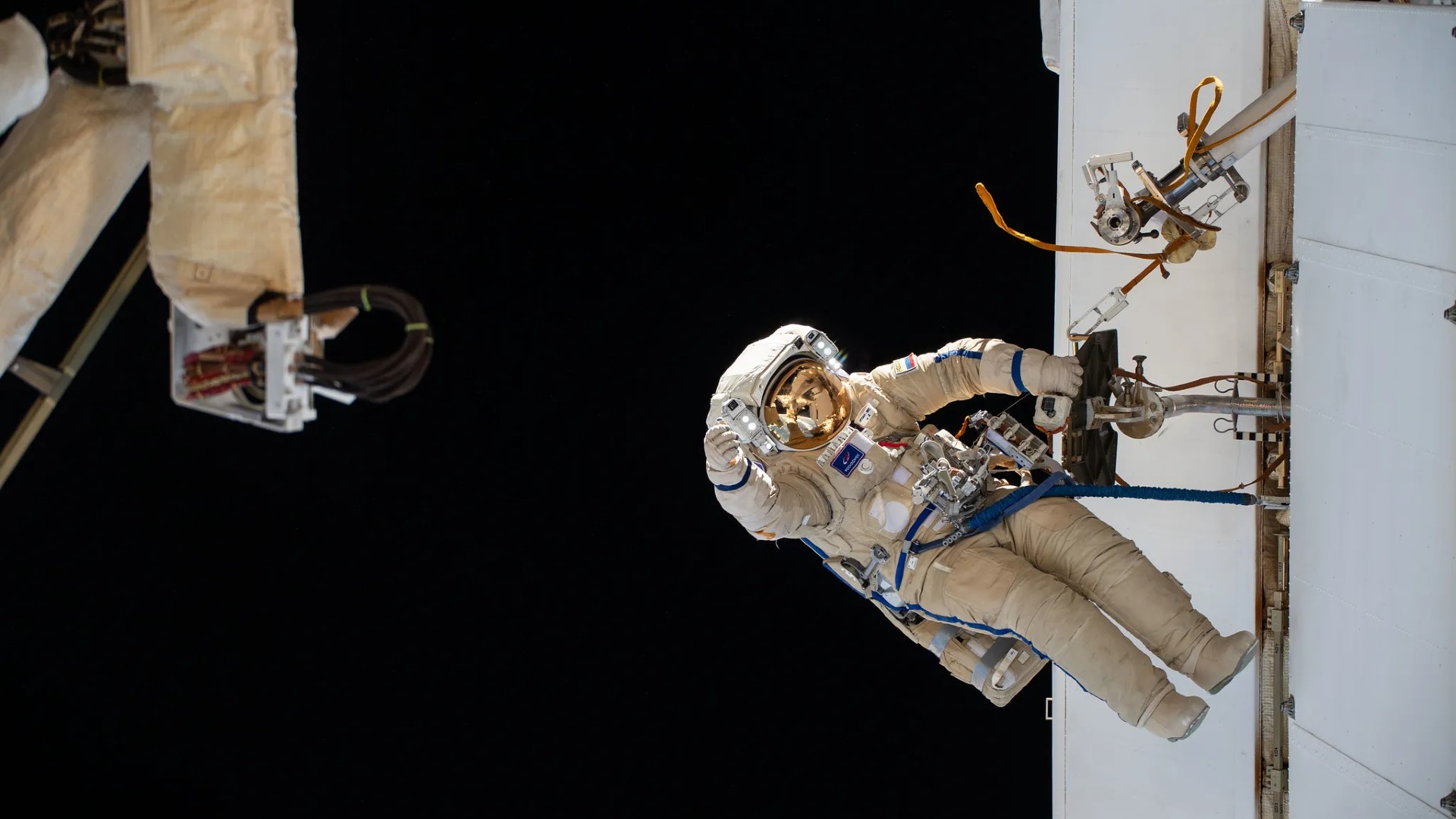Blue Origin Expects BE-4 Rocket Engine Qualification Tests to Be Done This Year

Breaking space news, the latest updates on rocket launches, skywatching events and more!
You are now subscribed
Your newsletter sign-up was successful
Want to add more newsletters?

Delivered daily
Daily Newsletter
Breaking space news, the latest updates on rocket launches, skywatching events and more!

Once a month
Watch This Space
Sign up to our monthly entertainment newsletter to keep up with all our coverage of the latest sci-fi and space movies, tv shows, games and books.

Once a week
Night Sky This Week
Discover this week's must-see night sky events, moon phases, and stunning astrophotos. Sign up for our skywatching newsletter and explore the universe with us!

Twice a month
Strange New Words
Space.com's Sci-Fi Reader's Club. Read a sci-fi short story every month and join a virtual community of fellow science fiction fans!
COLORADO SPRINGS — The chief executive of Blue Origin says he expects the company's BE-4 engine to complete qualification testing by the end of the year as the company ramps up work on its New Glenn orbital rocket.
In an April 19 interview during the 34th Space Symposium here, Bob Smith said testing of the BE-4 engine, which uses methane and liquid oxygen propellants, was going well as the company stepped through a methodical process of increased durations and thrust levels.
"We continue to progress along the lines of changing the power levels and going from various throttle settings," he said. That includes, he said, a test the company announced in March when the engine fired for 114 seconds at 65 percent of rated power. That duration is about half a typical mission duty cycle for the engine. [Blue Origin's New Glenn Megarocket in Pictures]
"We continue to roll through our test program and hope to qualify that engine by the end of the year," he said. "We're walking our way through that just to make sure we understand and characterize the engine fully."
Smith said the success the BE-4 program has enjoyed so far is based on a long, incremental development process. "I think people don't have a full understanding of how long this development has been going on. It's been going on for seven years," he said, progressing from injector testing to preburner and powerpack testing prior to full-scale hotfire tests. "It means we have a huge amount of component information to actually go rely on."
Blue Origin is developing BE-4 for its New Glenn launch vehicle, which will use seven such engines in its first stage. The company has completed all the architectural trades in the design of the large rocket, he said, and is now is making some of the first parts for the vehicle.
"We have the performance characteristics that cover all the missions — civil, commercial, national security — that we'd like," he said.
Breaking space news, the latest updates on rocket launches, skywatching events and more!
One of the recent changes in New Glenn's design is to use a version of its BE-3 engine, which runs on liquid oxygen and liquid hydrogen, over an upper-stage version of the BE-4 on the second stage. "It's a nice change for us, because it reduces a good amount of risk," he said.
The shift in engines reduces development risk, he said, since the company doesn't have to develop an additional version of the BE-4. It also provides a performance boost, as the BE-3's propellant combination has a higher specific impulse, or Isp, over liquid oxygen and methane.
"Having a highly energetic upper stage really works," he said. "You want on the first stage thrust and on the second stage Isp, and having a hydrogen upper stage obviously gives you that higher Isp."
He declined to comment on whether Blue Origin is competing for a Launch Services Agreement award from the U.S. Air Force. The Air Force is expected to award up to three such agreements this summer to fund development of new launch vehicles, with Orbital ATK, SpaceX and United Launch Alliance among those competing.
Smith did state that national security was a market Blue Origin would pursue for New Glenn, a shift from a couple years ago when company founder Jeff Bezos said it would leave such missions to other companies. "We're making sure it's available for as many payloads as we can possibly go fly," he said of the vehicle.
ULA is also considering the BE-4 for the first stage of its next-generation Vulcan vehicle, along with Aerojet Rocketdyne's AR1. Smith said ULA has employees embedded at Blue Origin to monitor BE-4 development. "I think they're happy with the progress that we're making in terms of the technical performance and general characterization of the engine," he said.
The companies are working on the details of a production contract to supply BE-4 engines to ULA. Asked when that contact might be finalized, he offered the same one-word response that Tory Bruno, president and chief executive of ULA, gives when asked when his company will make a decision on Vulcan's engine: "Soon."
New Shepard testing
In parallel with development of New Glenn and the BE-4 engine is the company's New Shepard suborbital launch vehicle. The company flew a new version of the New Shepard vehicle in December, the most recent test flight of the vehicle.
The next New Shepard test flight should take place soon. "Hopefully in the next few weeks," Smith said.
Blue Origin has been making updates to the vehicle, he said, intended primarily to improve operability rather than performance or reliability. Those upgrades took longer than expected, he said, hence the four-month gap since the last test flight.
Once the test flights resume, Smith said the company planned several flights to verify the vehicle's performance before putting people on board. "What we want to do is get a series of flights, test out the incorporation of some of the changes that we've made, and then make sure we've got a stable configuration that we can repeat several times before we get to first human flight," he said. That first crewed flight, he said, is expected by the end of the year.
Blue Origin has flown research payloads on several of its New Shepard test flights and plans to do so on upcoming flights as well. "We've had an incredibly good response," he said. "We've been able to sell out a lot of our capacity for our upcoming flights."
However, Blue Origin has yet to start selling tickets for suborbital space tourism flights on New Shepard, and Smith said there's no schedule for doing so. "We continue to be head down on making sure the configuration is good and stable and ready to fly," he said. "Once we all feel confident that that's the case, then we'll have the conversation internally about what prices are and what that whole process looks like."
This story was provided by SpaceNews, dedicated to covering all aspects of the space industry.

Jeff Foust is a Senior Staff Writer at SpaceNews, a space industry news magazine and website, where he writes about space policy, commercial spaceflight and other aerospace industry topics. Jeff has a Ph.D. in planetary sciences from the Massachusetts Institute of Technology and earned a bachelor's degree in geophysics and planetary science from the California Institute of Technology. You can see Jeff's latest projects by following him on Twitter.


